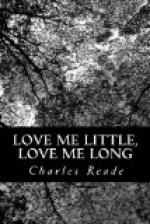“Very good, young gentleman, very good. Now it is my turn. I have got a word or two to say on the other side. The journals, which are so seldom agreed, are all of one mind about these glorious times. Account for that!”
“How can you know their minds, sir?”
“By their leading columns.”
“Those are no clue.”
“What! Do they think one thing and print another? Why should the independent press do that? Nonsense.”
“Why, sir? Because they are bribed to print it, but they are not bribed to think it.”
“Bribed? The English press bribed?”
“Oh, not directly, like the English freeman. Oblige me with a journal or two, no matter which; they are all tarred with the same stick in time of bubble. Here, sir, are 50 pounds worth of bubble advertisements, yielding a profit of say 25 pounds on this single issue. In this one are nearer 100 pounds worth of such advertisements. Now is it in nature that a newspaper, which is a trade speculation, should say the word that would blight its own harvest? This is the oblique road by which the English press is bribed. These leaders are mere echoes of to-day’s advertisement sheet, and bidders for to-morrow’s.”
“The world gets worse every day, Skinner.”
“It gets no better,” replied Richard, philosophically.
“But, Richard, here is our county member, and ——, staid, sober men both, and both have pledged their honor on the floor of the House of Commons to the sound character of some of these companies.”
“They have, sir; but they will never redeem the said honor, for they are known to be bribed, and not obliquely, by those very companies.” (The price current of M. P. honor, in time of bubble, ought to be added to the works of arithmetic.) “Those two Brutuses get 500 pounds apiece per annum for touting those companies down at Stephen’s. —— goes cheaper and more oblique. He touts, in the same place, for a gas company, and his house in the square flares from cellar to garret, gratis.”
“Good gracious! and he talked of the light of conscience in his very last speech. But this cannot apply to all. There is the archbishop; he can’t have sold his name to that company.”
“Who knows? He is over head and ears in debt.”
“But the duke, he can’t have.”




